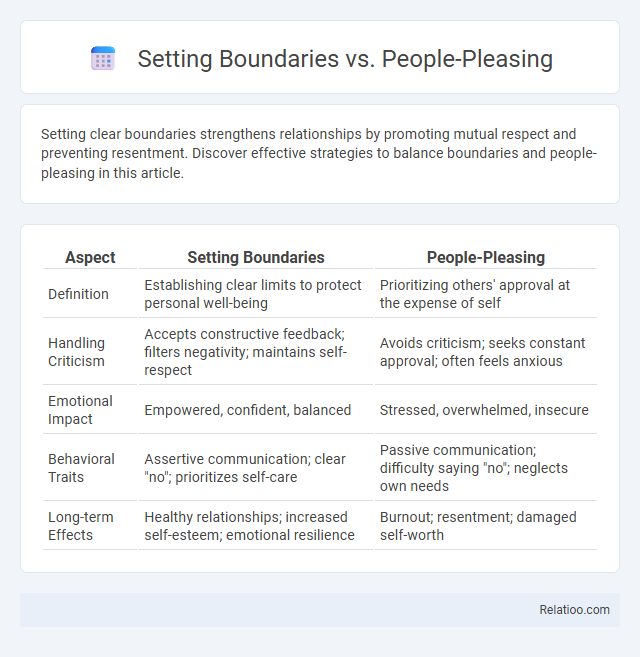Setting clear boundaries strengthens relationships by promoting mutual respect and preventing resentment. Discover effective strategies to balance boundaries and people-pleasing in this article.
Table of Comparison
| Aspect | Setting Boundaries | People-Pleasing |
|---|---|---|
| Definition | Establishing clear limits to protect personal well-being | Prioritizing others' approval at the expense of self |
| Handling Criticism | Accepts constructive feedback; filters negativity; maintains self-respect | Avoids criticism; seeks constant approval; often feels anxious |
| Emotional Impact | Empowered, confident, balanced | Stressed, overwhelmed, insecure |
| Behavioral Traits | Assertive communication; clear "no"; prioritizes self-care | Passive communication; difficulty saying "no"; neglects own needs |
| Long-term Effects | Healthy relationships; increased self-esteem; emotional resilience | Burnout; resentment; damaged self-worth |
Understanding Boundaries: What They Really Mean
Setting boundaries means clearly defining your limits to protect your emotional well-being, distinguishing it from people-pleasing, which often sacrifices your needs for others' approval. Emotional boundaries help you maintain a healthy sense of self by regulating how much emotional energy you share and absorb from others. Understanding boundaries empowers you to create balanced relationships, ensuring your needs are respected while fostering mutual respect.
The Psychology Behind People-Pleasing
The psychology behind people-pleasing often stems from a deep-rooted need for acceptance and fear of rejection, driving individuals to prioritize others' needs over their own. This behavior contrasts with healthy emotional boundaries, which protect personal well-being by clearly defining limits in relationships. Establishing boundaries reduces the tendency toward people-pleasing by fostering self-respect and emotional resilience.
Signs You’re Struggling with Setting Boundaries
Struggling with setting boundaries often manifests as difficulty saying no, feeling overwhelmed by others' demands, and experiencing resentment or burnout. You might constantly prioritize others' needs over your own, leading to emotional exhaustion and a blurred sense of self. Recognizing signs like compulsive people-pleasing, discomfort with assertiveness, and anxiety around conflict is essential for establishing healthy emotional boundaries and improving personal well-being.
The Consequences of People-Pleasing Behavior
People-pleasing behavior often leads to emotional exhaustion, increased stress, and resentment due to constantly prioritizing others' needs over personal boundaries. This pattern undermines self-esteem and fosters dependency, making it difficult to assert emotional boundaries effectively. Persistent people-pleasing can escalate to burnout and negatively impact mental health, highlighting the critical importance of setting clear and firm boundaries.
Why We Avoid Setting Healthy Limits
Fear of rejection and the desire for approval often lead You to avoid setting healthy limits, resulting in people-pleasing behaviors that compromise emotional boundaries. Emotional boundaries protect Your well-being by defining where Your feelings end and others' begin, but unclear limits make it difficult to maintain self-respect. Understanding the psychological triggers behind boundary avoidance is crucial for fostering emotional resilience and promoting authentic relationships.
The Benefits of Enforcing Personal Boundaries
Enforcing personal boundaries enhances emotional well-being by preventing burnout and reducing stress associated with people-pleasing behaviors. Clear limits promote healthier relationships by fostering mutual respect and preventing resentment. Establishing emotional boundaries strengthens self-awareness and empowers individuals to prioritize their needs without guilt.
Practical Strategies for Saying “No”
Mastering practical strategies for saying "no" involves clearly defining personal limits to maintain healthy emotional boundaries and avoid people-pleasing behaviors. Effective techniques include using concise, assertive language such as "I'm unable to commit right now," setting consequences for boundary violations, and practicing self-awareness to recognize situations that threaten emotional well-being. Implementing these approaches fosters respect for your time and priorities while reducing stress related to overcommitment.
Overcoming Guilt When Setting Boundaries
Overcoming guilt when setting boundaries involves recognizing that your emotional well-being is a priority and that saying no does not equate to selfishness. People-pleasing often stems from a fear of disappointing others, but establishing clear emotional boundaries protects your mental health and fosters healthier relationships. You can reduce guilt by reframing boundary-setting as an act of self-respect rather than a rejection of others' needs.
Transforming Relationships by Embracing Boundaries
Setting boundaries fosters healthier relationships by clarifying personal limits and expectations, which reduces resentment and enhances mutual respect. People-pleasing often undermines emotional boundaries, leading to burnout and diminished self-worth by prioritizing others' needs over one's own. Embracing emotional boundaries empowers individuals to communicate authentically and cultivate balanced connections, ultimately transforming relationships through increased trust and emotional safety.
Building Confidence: From People-Pleaser to Boundary-Setter
Setting boundaries is essential for building confidence by shifting from people-pleasing to assertive boundary-setting, empowering individuals to prioritize their needs without guilt. Emotional boundaries create a protective space that fosters self-respect and reduces vulnerability to manipulation or burnout. Developing clear limits enhances self-awareness and promotes healthier relationships, reinforcing a strong, confident identity.

Infographic: Setting Boundaries vs People-Pleasing
 relatioo.com
relatioo.com